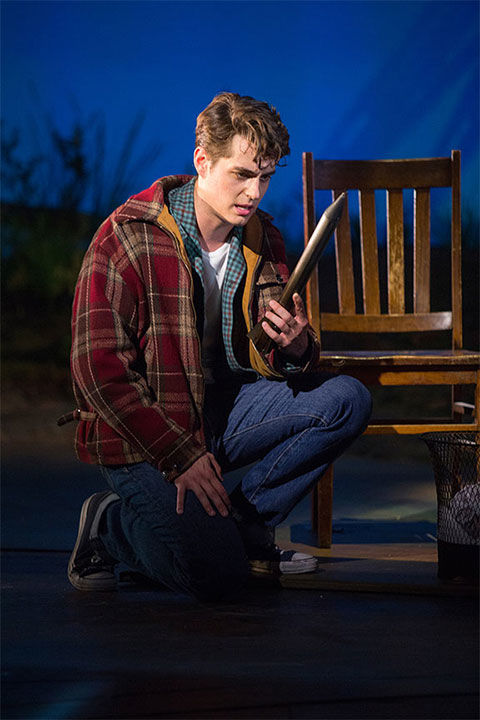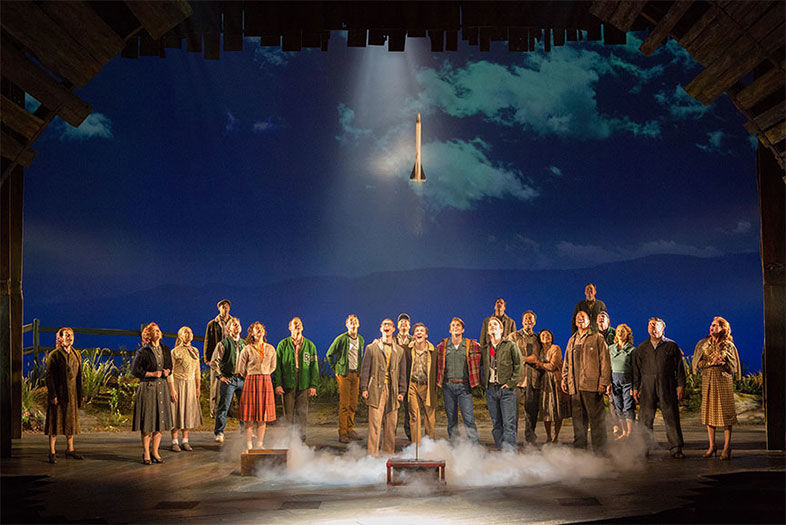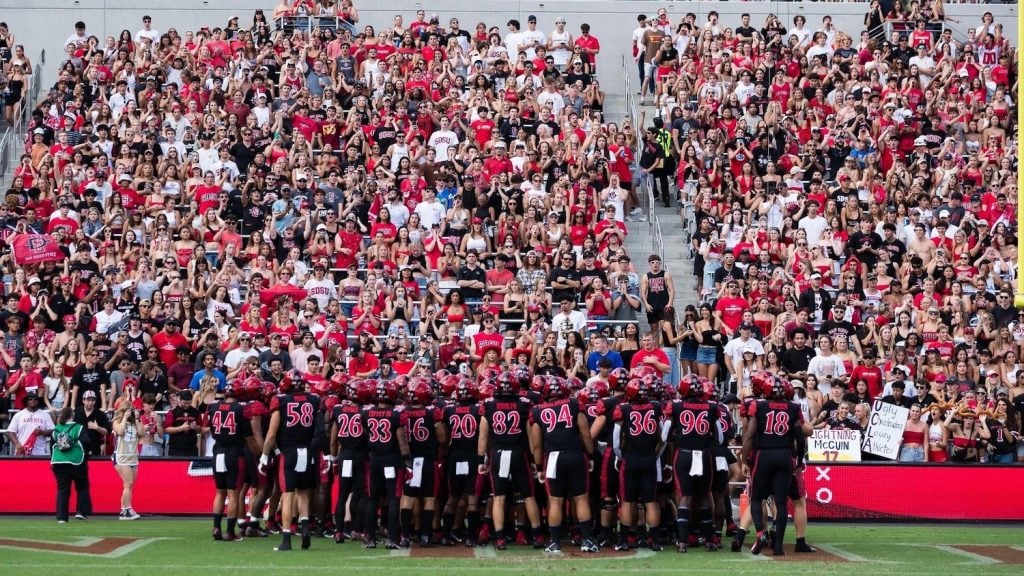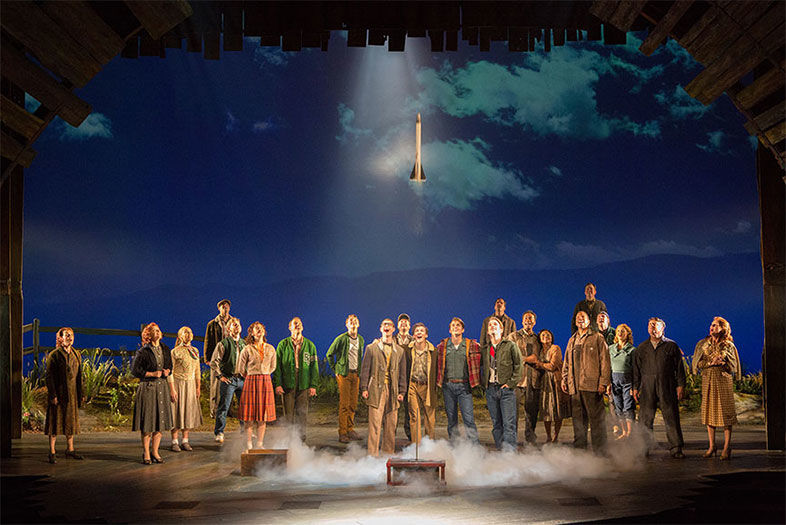October Sky isn’t the most obvious choice for a musical adaptation. The 1999 film is the real-life story of Homer Hickam Jr., a high school student in 1957 small-town West Virginia who, along with three friends, escapes a future as a coal miner by teaching himself rocketry. The “rural kid following their dreams despite their parents’ wishes” story has seen a lot of mileage in Americana, especially when it’s a disapproving father and a starry-eyed son, and especially when they’re Southern. Homer (Kyle Selig), who with those baby blue eyes, cherubic face, and outstanding pipes could be Billie Joe Armstrong’s more talented younger brother, channels the daydreaming, unabashed yearning of every kid who grew up reading science fiction comics instead of playing sports, catalyzing it and sending it skyward in big-hopes solo “Look to the Stars” and I-gotta-be-my-own-man father-son duet “I Want to Know.” These themes are eminently familiar to anyone who’s watched a single Oscar-season movie trailer, and the stage adaptation deftly wrings all the tears it can from them in all the expected places.
I had my doubts, though. For one, the film hitches these emotional stakes along a parallel trajectory with the literal vehicle for Homer’s success: The visual spectacle of his rockets. Seeing the early misfires, explosions, and wild kamikaze failures gradually improve into missiles that shake the earth for miles amplifies what might otherwise be a pat character arc. At least, they constituted a major reason why the film was so dear to my heart when I fell in love with it in middle school. And reexamining the story as an adult in 2016, it’s painfully obvious that there are zero roles for people of color, and that the few female characters function almost entirely as helpers to the more-important men. So I came into this show with some pretty high expectations—but I’m happy to share that they were exceeded.

‘October Sky’ Soars at The Old Globe
Kyle Selig as Homer Hickam in October Sky. | Photo: Jim Cox.
Where this story stands out against many cut from similar cloth is the equity with which it treats the hometown industry our hero is trying to escape from. Real-life Homer Hickam loved the people of Coalwood dearly, and though the visual metaphor of him donning a hard hat and sinking beneath the earth still conveys a powerful despair, the miners’ concerns and well-being are treated with deserving respect, as well. Notedly, the miners’ union leader, Ken (Kevyn Morrow), is given a much more prominent role here and is played by a black man—which is remarked upon briefly but realistically considering the 1950s setting, and lends additional tension to his negotiations with the company foreman: Homer’s father, John (Ron Bohmer). The two were once fellow miners, before the latter was promoted to leadership, and the fact that John intends to appoint Homer as his successor leads Ken to accuse him (rightly) of nepotism.
This conflict elevates the story’s labor struggle from backdrop to genuine B-plot, and creates further depth for John, who is one of this play’s standout roles. Where Chris Cooper’s take in the film was almost relentlessly cantankerous and sour, Bohmer shows that the man has much of Homer’s earnestness in him, though it be restrained by responsibility and smothered by the mine. Without changing the letter of John’s spoken browbeating, the strain in his features and posture communicates infinitely more of the character’s internal turmoil and worry over his family’s future. Likewise, his wife, Elsie (Kerry O’Malley), is given more agency than her film counterpart—without spoiling anything, some true-to-history details of her independence and financial acumen were retained from Homer’s memoir that the film had omitted. The song the couple shares, “The Man I Met,” paints a welcome picture of them as complete people with a story of their own that began long before their son’s.
This show does well by its women; as well as it possibly could have, given the source material. It’s a credit to writers Brian Hill and Aaron Thielen, and composer and lyricist Michael Mahler, that they found a way to open the second act putting all three of the play’s female characters together, in a musical space if not a physical one. For my money, “The Last Kiss Goodbye” is hands-down the show’s best number. Without rewriting or significantly expanding the roles of Elsie, teacher Miss Riley (Sandra DeNise), or love interest Dorothy (Eliza Palasz), the song finds the common fears and hopes they share, striking at the heart of how it feels to be a woman in a place where most men face the prospect of injury or death every day they go to work.
This is one of the great joys of musicals: that everyone, no matter how secondary the character, gets a turn to sing their story—even Mr. Bykovski (Joel Blum), the machinist who builds Homer’s first rockets. His “Return to the Earth” is a humble refrain that borrows part of its melody from the Russian folk song “Kalinka,” and in another nice touch handled with the same wise lightness as Ken’s race, at one point Bykovski responds to Homer’s unrest with “There are worse places in the world than Coalwood.”
The film includes a throwaway gag in which the boys, searching for 100-percent pure alcohol for rocket fuel, get drunk at a backwoods distillery, and in a surprisingly brilliant move, the adaptation expands this into a rollicking bluegrass hoedown. “Moonshine” gives some of the musicians and ensemble players their turn in the spotlight and is easily one of the best numbers in the show.
The special effects used for the rocket launches are impressive, even given the limitations of the format—my heart goes out to the stagehands hidden in the rafters (I assume) whose job it is to catch them every night. But it turns out that my skepticism about those rockets being the story’s chief emotional linchpins was unfounded: I should’ve known, as director and choreographer Rachel Rockwell surely did, the great Spielbergian truth that audiences rely less on the actual visual spectacle for their own catharsis than on how the characters are reacting to it. We don’t need to be impressed by the physical reality of Homer’s rockets soaring miles into the sky when we can experience that same exhilaration in the awestruck faces of everyone on stage, especially once we’ve become invested in how much those rockets mean to them. The Old Globe’s October Sky ultimately soars as a masterful adaptation that does better by nearly all of its characters than the film; a deftly and powerfully realized story that will leave your heart, as it did mine, uplifted right along with everyone in Coalwood.
October Sky at The Old Globe theater, through October 23

‘October Sky’ Soars at The Old Globe
The cast of the West Coast premiere of October Sky at the Old Globe. | Photo: Jim Cox.










